The tragic death of Emperor Paul I
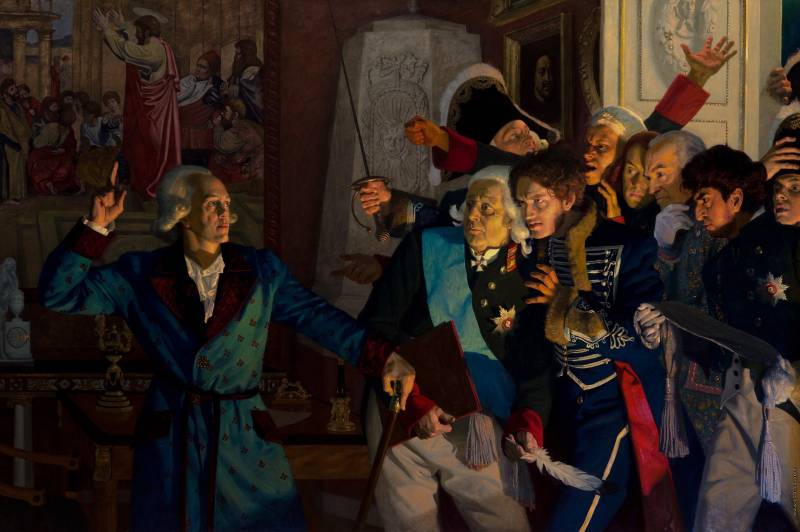
S. Chudanov. Assassination of Paul I on the night of March 11-12, 1801
In this article we will continue the story of the conspiracy against Paul I and talk about the death of this emperor and the fate of his killers.
March of drunken guards
As we remember from previous article, on the eve of the assassination of Paul I, from 40 to 60 guards officers gathered in the house of the Governor-General of St. Petersburg P. A. Palen, all of them, except Bennigsen and Palen himself, were drunk. It was then that Palen said his famous phrase:
Palen proposed to split into two groups: the “official” one, with him at the head, and the “shock”, which was to be led by Platon Zubov and Bennigsen. Since everyone was suddenly confused, he had to “place everyone, except the generals, indiscriminately, in turn: one to the right, one to the left.” The Zubov brothers split up: Nikolai went with Plato and Bennigsen, Valerian, who was one-legged (and had difficulty climbing stairs), went with Palen.
A. S. Pushkin described this “campaign” in his poem “Liberty”:
Drunk with wine and anger,
Hidden killers are coming,
There is insolence on their faces, fear in their hearts.”
Palen positioned his detachment at the front entrance, declaring that anyone who tried to come to the aid of the emperor would be arrested. However, many believe that if the mission of the second group failed, he was going to arrest the unlucky conspirators.
Zubov and Bennigsen led their men to the Christmas gate of the castle. With them was Parade Major Argamakov, who betrayed the emperor, and had the right of access to the emperor. Let us turn again to the poems of A. S. Pushkin:
The drawbridge is silently lowered,
The gates are open in the darkness of the night
By the hired hand of betrayal..."
Already in the castle, the conspirators began to gradually “weed out”, and with each step there were fewer and fewer of them. Even Platon Zubov tried to escape, but he was stopped by Bennigsen, who said:
Murder
Either 10 or 12 people approached the door of Paul I’s bedroom. The sentry Agapeev and the room hussar Kirillov stood here. They were unarmed, and therefore the conspirators easily and quickly dealt with them: they were stunned with saber blows to the back of the head (some claim that one of them was stunned, and the other ran away).
After this, Argamakov entered into negotiations with the royal valet. Some recalled that he claimed that morning had come and it was time to wake up the emperor, others that he spoke about a fire.
The valet was very surprised, but still opened the door - this was enough: the conspirators burst into the imperial chambers. Paul heard the noise, and he could have been saved if, on the advice of Palen, he had not ordered the door to the empress’s bedroom to be boarded up.
But it remains a mystery why he didn’t use the secret passage leading to the room of his favorite, Anna Gagarina? Got confused and simply forgot about this opportunity? Or did he not have time to open the door and was forced to hide in his bedroom?
Some recalled that he stood behind the window curtain, others - behind the fireplace screen, others - that he was behind the bedside screen.
One way or another, having not found the emperor in the bedroom, the conspirators were close to panic, since it was clear to everyone that this night invasion into the emperor’s bedroom would be impossible to explain with any reasonable arguments, and the surviving Paul would not spare anyone.
Only Bennigsen maintained composure, who, feeling the bed, declared:
Very soon Pavel was discovered, and Bennigsen, who had drawn his sword, announced to him:
And added:
Pavel, who mistook one of the conspirators for his son Konstantin, tried to escape from the bedroom.
At that moment, some noise was heard in the castle, and Platon Zubov, completely chickened out, was the first to run out of the bedroom, followed by many other conspirators. Only a few people, led by Bennigsen (and some believe only Bennigsen), were left alone with the emperor.
However, it turned out that it was not soldiers loyal to him who were heading to the emperor’s chambers, but other conspirators—those who had fallen behind earlier.
Bennigsen later recalled:
However, other conspirators said that at the time of the murder, Bennigsen was standing nearby with a candle in his hand and looking at the paintings hanging in the hallway.
Now Platon Zubov read the act of abdication to the emperor, but Pavel firmly answered: “No, I will not sign,” and then the cry of Colonel V. Yashvil, the head of the Horse Guards artillery, was heard:
That is, not only Palen, but also many other conspirators understood perfectly well that the emperor should be killed even if he signed the required document.
Pavel began to call for help, and Nikolai Zubov, “a man of enormous stature and extraordinary strength,” whom his acquaintances called a “bull” (and some “behind his back” - a “stupid bull”) stepped in. With the words “why are you shouting like that,” he hit the emperor on the hand. The indignant Pavel, in turn, hit and pushed him away. The Tsar now behaved so confidently and boldly that the conspirators were again at a loss, but Bennigsen and Platon Zubov were already openly calling for reprisals against him.
Bennigsen is said to have said:
He was supported by Platon Zubov, who stated:
After this, Nikolai Zubov hit Pavel in the temple with a golden snuffbox.
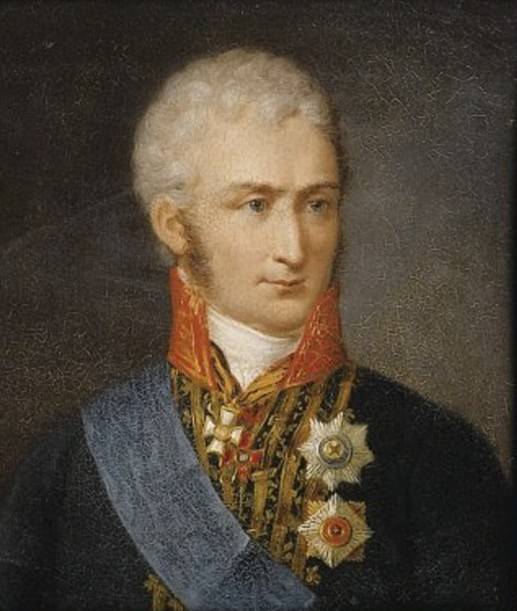
Portrait of Count N. A. Zubov by an unknown artist
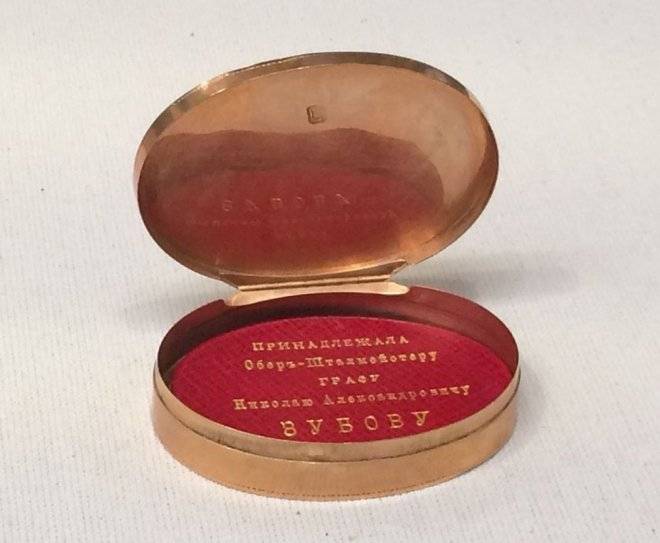
Nikolai Zubov's snuff box, given to him by Catherine II
The emperor fell and other conspirators attacked him. Someone tore off the scarf hanging over Paul's bed and began to strangle the emperor with it.
Many believe that the role of executioner was performed by an officer of the Izmailovsky regiment named Skaryatin. Platon Zubov stood nearby, turning to the window, and kept repeating:
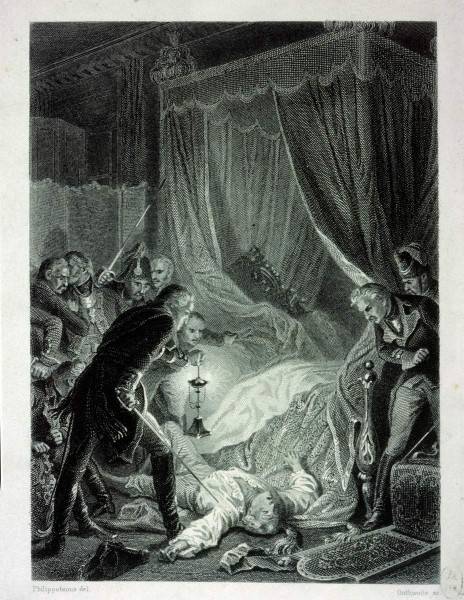
Death of Paul I in an engraving by Utwait from a drawing by Filippoto
Soon it was all over.
In the notes of one of the life physicians you can read:
"Alexander the Blessed" begins to reign
Then there was a series of fainting spells (feigned and real), acting, undisguised cynicism and rivalry between the son and his mother.
Having received the news of his father’s death, Alexander I tried to cry, but changed his mind after Palen told him:
Realizing that power was not on his side now, and someone else might be called “to reign,” Alexander decided to start reigning - but that was not the case. His mother, Empress Maria Feodorovna, announced her claims to the crown.
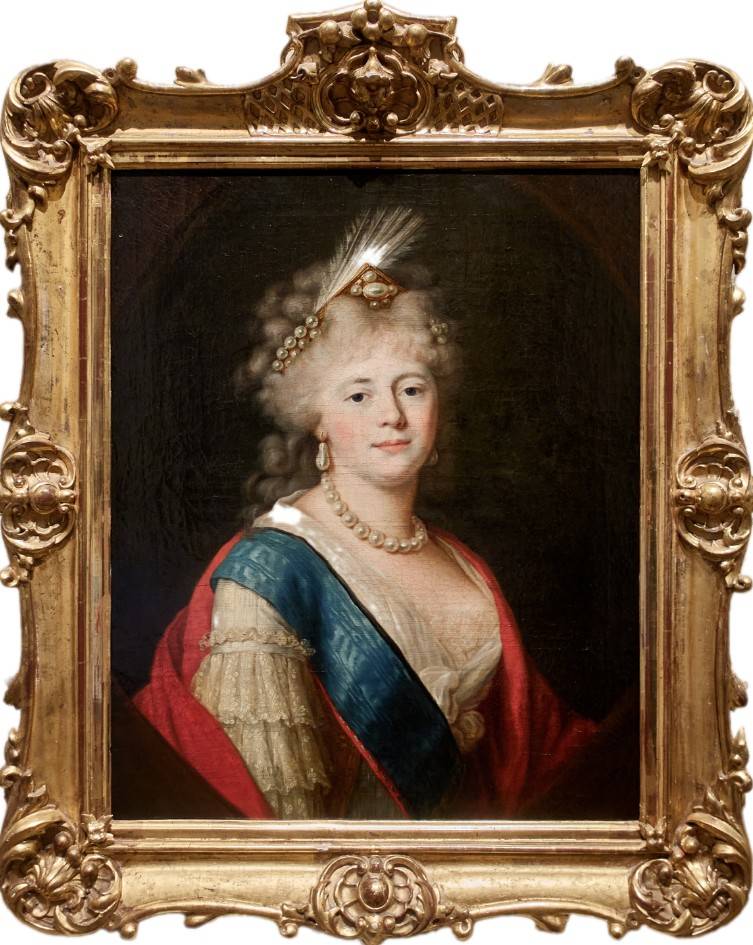
Maria Feodorovna in a portrait by an unknown artist, late XNUMXth century
Hearing the noise, she decided that a fire had started and, having dressed, tried to leave the bedroom - but was stopped by the conspirators standing at the door, who literally pushed her back. Being a smart woman, she, of course, realized that another palace coup was taking place. And therefore, the news of the death of her husband, with whom Countess Charlotte von Lieven (governess to the younger children of Paul I) came to her on Palen’s orders, should not have taken her by surprise.
Langeron recalled:
“No,” she exclaimed, “he died, they killed him!”
Madame Lieven could no longer hide the truth; then the empress rushed to her husband’s bedroom.”
And here’s how Lieven herself recalled it:
“So even if they kill me, I want to see him!”
And then the empress decided that she could well replace her murdered husband on the throne - in fact, why is she worse than Anna Ioannovna, Elizaveta Petrovna and the two Catherines?
For four hours she insisted that she “wants to rule” (ich will regieren) and refused to recognize her son as emperor. The naive woman did not understand that the guards in Russia do not engage in charity, and in order to become an empress, you need to have at least “a certain number of grenadiers, a cellar with vodka and several bags of gold” (the words of the Saxon envoy Petzold, said to him after the seizure of power Catherine II).
Nevertheless, Maria Fedorovna acts. She tries to break into the room where the doctors are at this time trying to hide the traces of an “apoplectic blow to the temple with a snuff box.” Velyaminov-Zernov recalled it this way:
One of the Zubovs said: “Get that woman out there.” Evsei Gordanov, a strong man, grabbed her in his arms and brought her back to her bedroom like a burden.”
Maria Fedorovna managed to get out of the bedroom and tried from the balcony
turn to the troops - she was “removed” from there by order of Palen.
Maria Feodorovna, in a roundabout way, through other rooms, again went to her husband’s bedroom, here her path was blocked by 40 Semyonovites, led by K. Poltoratsky, who recalled:
- “How can you not? I’m still an empress, please let me in.”
- “The Emperor did not order.”
- “Who-who?”
- “Sovereign Alexander Pavlovich.”
She flared up, furiously pushing me away, grabbed me by the collar, threw me against the wall and rushed towards the soldiers. I gave them the signal to cross their bayonets, repeating: “Not ordered, Your Majesty.”
She wept bitterly."
Bennigsen appeared and suggested that she stop “playing a comedy”:
Then Bennigsen, on behalf of the new emperor, demanded that she follow him to the Winter Palace to swear allegiance to the emperor. Prince Eugene of Württemberg recalled:
Elizaveta Alekseevna replied:
Maria Fedorovna still wandered around the palace, and, as they say, either fought with the soldiers or fell on her knees in front of them. Finally, having accepted defeat, she went to the Winter Palace. Then she came to her husband’s body - together with Alexander. Here Maria Fedorovna “with a look full of dignity” said to her son:
Not knowing what to answer, Alexander chose to faint. Having come to his senses, he obediently promised that with him everything would be “like with grandma.”
After the assassination of the emperor
We often read that at the news of the death of Paul I, Petersburg was filled with rejoicing. It remains only to clarify that only the nobles rejoiced at his death, while the people mourned the death of this emperor; there is numerous evidence that for a long time ordinary people lit candles in memory of Paul, and even asked him for “heavenly intercession.”
The cause of death of Paul I was declared to be apoplexy, but the true cause was, as they say, an open secret, and therefore the court wits immediately “clarified the diagnosis”: “apoplexy blow to the temple with a snuff box.” Nevertheless, until 1905, the official cause of death of this emperor was called a stroke.
Neither the doctors nor the court painter were able to hide the traces of this blow on the emperor’s face, and therefore, during the official farewell of the deceased, a triangular hat was pulled over his forehead, hiding his left eye and temple.
The manifesto on Alexander’s accession to the throne was written by Senator Troshchinsky - by the way, the brother-in-law of Nikolai Vasilyevich Gogol’s father, he was also part of the conspirators.
None of the emperor’s murderers suffered serious punishment, and Napoleon had every right to sneer at Alexander:
Palen, at the insistence of the Dowager Empress Maria Feodorovna, was sent into retirement “due to illness from all his affairs” and until February 1826 lived quietly on his Courland estate, not repenting at all and declaring to everyone that he had accomplished “the greatest feat.”
Nikita Petrovich Panin was returned to St. Petersburg and actually headed the Collegium of Foreign Affairs. Then he went on a trip to Europe. Upon his return, Alexander I, who had lost interest in him, sent Panin to the Dugino estate that belonged to him - and this disgrace was in no way connected with the murder of Paul I.

Duginsky Palace in a photograph from the beginning of the XNUMXth century.
Here he lived in full prosperity for more than 30 years, mainly studying the occult sciences and magic. At the same time, he complained that he was “subjected to civil execution.”
Bennigsen, whom, as we remember, the wife of the murdered emperor promised to “make repent,” was already appointed Lithuanian governor in March 1801, and in June of the following year became a cavalry general. He fought a lot against Napoleon and his marshals (the battles of Pultusk, Preussisch-Eylau, Guttstadt, Heilsberg, Friedland, Bergfried, the battles of Borodino and Tarutino, the battle of Leipzig, the siege of Hamburg). In 1818 he retired and went to Hanover, dying in October 1826.
Platon Zubov went abroad at the end of 1801, where, as we remember from the article Platon Zubov. The last favorite of Catherine II, participated in an anecdotal duel with the Chevalier Joseph de Saxe, who once almost took his place in Catherine’s bed.
A year later he returned to Russia. In 1814 he settled on his Lithuanian estate Janishki. Neighbors remembered him as an incredibly stingy and sloppy person who quickly became decrepit. A year before his death, 54-year-old Platon unexpectedly fell in love with the 19-year-old poor noblewoman Tekla (Fekla) Ignatievna Valentinovich (this family owned only 30 “souls” of peasants) and actually “bought” her from her parents - for a million rubles.
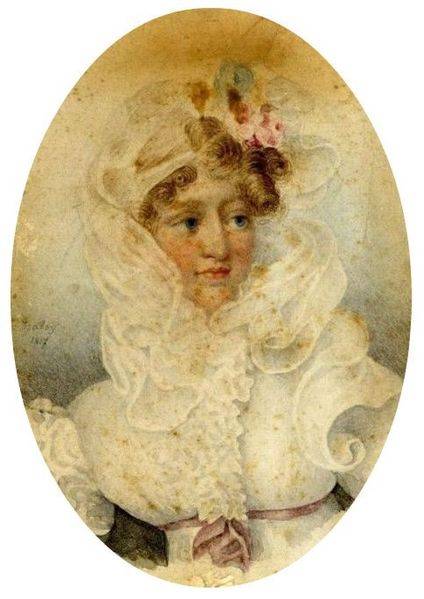
Tekla Valentinović in a portrait of Izabe, 1820
They settled in the Ruenthal estate, here three weeks after the death of Zubov (the former temporary worker of Catherine II died in April 1822), Tekla gave birth to a daughter who died in infancy. K. Walishevsky reports that as an inheritance she received “twenty million, which had long been uselessly lying in the storerooms of the house” and many diamonds. Plato's relatives tried to sue her, but were unsuccessful. Later, this woman married Count Andrei Shuvalov, with whom she gave birth to three children.
Nikolai Zubov, who inflicted an “apoplectic blow to the temple with a snuff box” on the father of Alexander I, remained in the service and at his posts – chief horseman and president of the Court stable office. He retired in 1803 and died on his Moscow estate in August 1805, at the age of 42.
Valerian Zubov, who was often ill, settled on a Courland estate, where he led a quiet, inconspicuous life and died in the summer of 1804.
But the life of Olga Zherebtsova-Zubova turned out to be very eventful and very scandalous. As we remember, shortly before the assassination of Paul I, she left Russia and learned about his death at a ball given by the Prussian king. After this, Olga went to London, where, as some contemporaries claimed, she received 2 million rubles to transfer to the participants in the conspiracy.
Her protégé A. Herzen, for example, wrote about this, who himself never refused foreign money, had close ties with the Rothschild clan and, to call a spade a spade, was also that “foreign agent”. By the way, Zherebtsova never shared this money with anyone. However, historians do not yet have a receipt for Zherebtsova receiving this amount.
In London, Olga learned that her lover Charles Whitworth had married the Duchess of Dorset, and caused a terrible scandal. She calmed down only after receiving compensation in the amount of £10 from her rival. After this, she entered into a relationship with the Prince Regent - the future George IV, and even hinted that she had secretly married him.
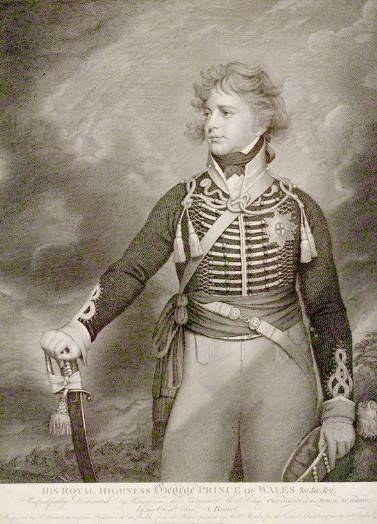
George, Prince of Wales, 1798
In 1806, she gave birth to a son from the prince, who received the name George (Egor Avgustovich) Nord. He rose to the rank of colonel, and one of his sons, Yegor Yegorovich Nord (Olga’s grandson), was the Russian consul in Persia, where he died of smallpox.
Olga’s legitimate daughter (from Chamberlain Zherebtsov), Elizaveta Alexandrovna, took after her mother and “became famous” by having a relationship with a French prisoner of war, Count Piret, and became pregnant by him.
But let's return to the sister of the Zubov brothers. Olga Zherebtsova returned to St. Petersburg in 1810, here she helped Herzen obtain a passport to leave Russia.
By the way, they say that during her stay abroad, Olga “closely” met the father of this oppositionist - this is how some explain her participation in his fate.
And Olga Zherebtsova herself in St. Petersburg was known for her opposition to Nicholas I, allowing herself unflattering remarks about the emperor and his entourage. With age, her character completely deteriorated; in society she was known as a grumpy old woman who was always dissatisfied with everything.
In conclusion of the article, we will say that one of the representatives of the Zubov family became famous for his duel with A.S. Pushkin, which is believed to have been described in the story “The Shot”. Having lost at cards, Pushkin hinted at his opponent’s “unclean” game and was challenged by him to a duel, which took place in the vicinity of Chisinau. Standing at the barrier, the poet ate cherries that were poured into his cap. Here is a quote from the story “The Shot”:
Zubov missed, Pushkin refused his shot.
Information